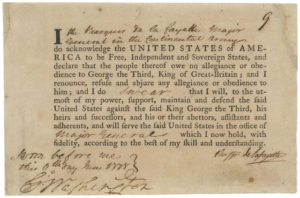 I, Peter Amiel, do acknowledge the thirteen United States of America, namely New Hampshire, Massachusetts-Bay, Rhode Island, Connecticutt, New York, New Jersey, Pennsylvania, Delaware, Maryland, Virginia, North Carolina, South Carolina and Georgia, to be free independant, and Sovereign States, and declare, that the People thereof owe no Allegiance or Obedience to George the Third King of Great Britain; and I renounce refuse and abjure any Allegiance, or Obedience to him. And I do Swear, that I will, to the Utmost of my Power Support, maintain and defend, the Said united States against the Said King and his Heirs and Successors and his and their Abettors, Assistants and Adherents, and will Serve the Said United States, in the office of Commander of the armed sloop the Alliance which I now hold, and in any other Office which I may hereafter hold, by their Appointment, or under their Authority, with Fidelity and Honour, and according to the best of my Skill and Understanding. So help me God.
I, Peter Amiel, do acknowledge the thirteen United States of America, namely New Hampshire, Massachusetts-Bay, Rhode Island, Connecticutt, New York, New Jersey, Pennsylvania, Delaware, Maryland, Virginia, North Carolina, South Carolina and Georgia, to be free independant, and Sovereign States, and declare, that the People thereof owe no Allegiance or Obedience to George the Third King of Great Britain; and I renounce refuse and abjure any Allegiance, or Obedience to him. And I do Swear, that I will, to the Utmost of my Power Support, maintain and defend, the Said united States against the Said King and his Heirs and Successors and his and their Abettors, Assistants and Adherents, and will Serve the Said United States, in the office of Commander of the armed sloop the Alliance which I now hold, and in any other Office which I may hereafter hold, by their Appointment, or under their Authority, with Fidelity and Honour, and according to the best of my Skill and Understanding. So help me God.
Peter Amiel (1)
Test William MooreJoy CastleJohn Adams
Subscribed 23 June 1778
Sworn before us at Passi this 23d day of June 1778 (2)
Arthur Lee
John Adams
MS, in JA’s hand (PPAmP: Franklin Papers); docketed: “Peter Amiels Decn of Allegiance.”
1. This is an example of the oath required by the Commissioners of those going to America or entering its service. Amiel’s oath and appointment as captain of the sloop Alliance was the result of a scheme proposed by Poreau, Mackenzie & Cie. of Dunkirk to outfit a privateer at that port. According to a letter from the company of 7 July (below), this proposal was presented and approved during conversations between the Commissioners and a member of the firm visiting Passy; thus little is known of it except what can be inferred from the letter noted above and those to the Commissioners from Francis Coffyn of 7 and 9 July (both below). The Commissioners, having been authorized to select the captain, chose Peter Amiel, formerly of Boston and captain of the merchant ship Ranger, who was then in Paris and in contact with the Commissioners. On 22 June they issued a bond for the Alliance and on the 23d, in addition to administering the oath, sent Amiel the instructions for commanders of privateers and ships of war adopted by the congress on 3 April 1776. Amiel went to Dunkirk to assume command but, disappointed with the small size of the Alliance, soon withdrew, and the project was terminated. Amiel later received a commission as a lieutenant in the Continental Navy and served under John Paul Jones on the Bonhomme Richard (Cal. Franklin Papers, A.P.S., 3:431; Gérard, Despatches and Instructions, p. 440, note 2; JA, Diary and Autobiography, see index under Amiel, Peter).
2. This sentence is in the hand of Arthur Lee.
NOTE: The annotations to this document, and any other modern editorial content, are copyright © The Massachusetts Historical Society. All rights reserved.
~ Reference ~
“Peter Amiel: Oath of Allegiance to the United States, 23 June 1778,” Founders Online, National Archives. [Original source: The Adams Papers, Papers of John Adams, vol. 6, March–August 1778, ed. Robert J. Taylor. Cambridge, MA: Harvard University Press, 1983, pp. 232–233.]
NOTE: The image at the top of the page is NOT of Peter Amilel, but of the oath of allegiance taken by the Marquis De La Fayette, , Major General in the Continental Army sworn before George Washington on June 9, 1778. There are no apparent images of the Ariel Oath. ~ Editor
